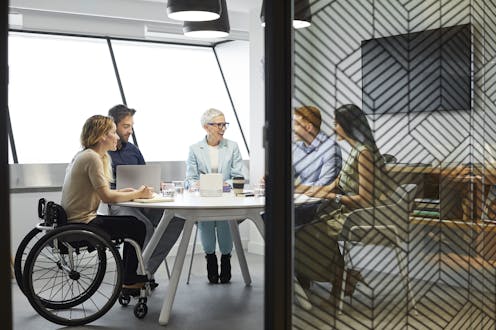Working from home has worked for people with disability. The back-to-the-office push could wind back gains
- Written by Sue Williamson, Associate Professor, Human Resource Management, UNSW Canberra, UNSW Sydney

A push is underway to get employees back into the office. The Commonwealth Bank kick-started this conversation recently, with reports the organisation is requiring staff to work at least half the week on-site.
A range of organisations are directing employees to return to the office. These reportedly include Amazon, General Motors, Meta and Disney.
But although COVID lockdowns have ended, many employees want to continue to work from home. Earlier research (by the lead author of this article) shows working from home has particular benefits for employees with disability.
So there may be more at stake for workers with disability when it comes to corporate mandates about where they do their job.
A much shorter commute
We began our research at the height of the pandemic lockdowns in 2020 (with the assistance of the Community and Public Sector Union). We repeated our survey of almost 5,000 public servants (just over a quarter who identified as living with disability) in 2021. We found disabled employees valued working from home highly.
Almost half (47%) of employees with disability would like to work from home two or three days a week. Over 40% want to work from home for four or five days a week.
Our findings tally with other research, including a small survey in the United Kingdom that found more than two-thirds of disabled employees want to work from home four or five days a week.
Why do disabled employees prefer to work from home? As with other employees, not commuting is a significant benefit. This is particularly beneficial for employees who have mobility impairments.
But commuting isn’t the only issue
Working at home also enables better management of health conditions. Our disabled survey respondents experienced reduced negative sensory issues and increased capacity for focus. One respondent told us:
Due to disability, less distractions and calmer environment, [I am] able to manage my conditions better and perform better.
Another person said it means greater working capacity:
I am disabled, and [working from home] reduces fatigue and pain. I have few sensory issues working from home.
Working from home also reduces the time taken to manage disability or chronic health conditions. One respondent mentioned “less time spent trying to use facilities due to mobility issues”. Another asserted she was “no longer wasting time adjusting my environment to suit me”.
Respondents also said their mental health improved thanks to reduced stress, less anxiety and feeling happier at work. Almost two-thirds of disabled employees in our research believed they were more productive when working from home than at an office or external workplace.
Productivity gains are being realised by managers and organisations. We found disabled employees believe managers and organisations support them working from home, and these gains are likely to continue.
Benefits to organisations
In a tight labour market, organisations need to keep their workers.
A large study of almost 24,000 people across 27 countries found a quarter of employees said they would quit if forced back to the office. McKinsey researchers found disabled employees were 14% more likely to leave than employees without disability if they could not work in a hybrid way from both home and the office.
Increasing the employment of disabled people enables organisations to access an under-utilised talent pool.
Labour market participation is comparatively low for disabled people. Only 48% of adults with disability are in the labour force, compared to 80% of those without disability. Researchers have found the employment rate for disabled people in Australia has decreased over the past decade.
In the United States, labour shortages post-COVID have reportedly led to increased numbers of disabled people being employed. Australian human resource practices appear to be lagging, with the exception of the public service, which recently announced it would remove the cap on the number of days a week an employee can work from home.
What else can employers do?
Creating inclusive workplaces that value and accept disabled workers means including those working from home. This can be facilitated by:
- training managers in how to manage hybrid teams (who work from home and a central workplace), hybrid employees and disabled employees working from home
- assessing the skills and capabilities of disabled employees, rather than focusing on how they fit into a “traditional” workplace
- allowing employees with disability to work from home to increase their autonomy, productivity and health outcomes
- enabling managers to approve requests from disabled employees to work from home above any organisational cap. Higher levels of approval can be onerous and may deter employees from requesting to work from home.
Organisations need to take a nuanced approach to working from home. Some employees may benefit from spending more time in the office. For disabled employees, enabling them to exceed a mandatory – and often arbitrary – work-from-home cap may deliver the best outcomes for both organisations and employees.
Read more: Real-life autism disclosures are complex – and reactions can range from dismissal to celebration
Authors: Sue Williamson, Associate Professor, Human Resource Management, UNSW Canberra, UNSW Sydney



















